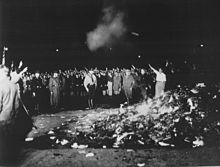Transgender genocide
[1][2][3] Adam Jones wrote in his 2017 book Genocide: A Comprehensive Introduction that "In recent years, as gay rights have become gradually more accepted and respected, the burden of atrocity has increasingly targeted transgender women and male transvestites.
[3][10] Matt Fuller and Leah Owen argued that while Nazi anti-queer ideology was "incoherent and erratic", they targeted transgender people with genocide and memoricide.
They cited Bauer (2017) to explain a psychological element to this, stating "the mere presence of the bodies and desires of trans people was a challenge, threat, and source of anxiety to many Nazis, meaning they – or the physical archive that reflected their identity – had to be destroyed.
Masculine presentations from those assigned female at birth were stigmatized: the National Socialist Women's League published a book in 1934 which warned gender ambiguity represented "signs of degeneration emanating from an alien race ... inimical to reproduction and for this reason damaging to the Volk.
[20][21] Sue E. Spivey and Christine Robinson have argued that the ex-gay movement, which encourages transgender as well as other LGBT people to renounce their identities, advocates social death and therefore could meet some legal definitions of genocide.
[22] Spivey and Robinson argued that "by waging a culture war using hate propaganda and misusing scientific research to gain public legitimacy, the movement seeks to deploy state powers and the medical profession to perpetrate genocidal acts on its behalf.
"[27] Similar sentiments were expressed in a WPATH public communique: "Anti-transgender health care legislation is not about protections for children but about eliminating transgender persons on a micro and macro scale.
[32] In line with the convention, they argue that transphobic discrimination and violence are not random or atomized, but rather come from the intent "to eradicate a group of people who violate a widely held and popularly reinforced norm of binary gender with a connection to heteronormative sexuality.
They say that transgender people face an increased risk of abuse and violence throughout their lives and that, despite being targeted in ways that fit some criteria of the Genocide Convention, they do not have access to the same legal protections as other groups.
"[34] Valerie Oosterveld attributed this definition to conservative political pressure from states like Azerbaijan, the Holy See, and some nongovernmental organizations in the lead-up to the treaty's adoption.
[44] Leah Owen, a lecturer at Swansea University, has argued that anti-transgender ideologies rely on "discourses of 'toxification'", drawing on a paper by Rhiannon Neilsen[45] that proposed "toxification" as a more precise alternative to the traditional fourth stage of genocide, dehumanization.
Owen compares Nielsen's concept of toxification, in which groups of people are compared to pathogens or threats and their removal from society is necessitated, to statements from Popes Benedict XVI and Francis, Janice Raymond, Abigail Shrier, and Helen Joyce,[46]: 486–488 arguing that regardless of agreement on other issues, anti-transgender activists consistently seek to reduce or eliminate transgender people's public presence.
Nevertheless, she refrains from claiming that the modern anti-gender movement is inciting genocide yet, arguing that it lacks a securitizing urge to mobilize against transgender people.
[49] Sterilization that is forced upon transgender people, in order to obtain legal recognition, is characterized by political theorist Anna Carastathis as a violation of reproductive rights, eugenic, and genocidal.
[58] In 2018, Planned Parenthood of New York City president Laura McQuade said in a speech that a Trump administration proposal to change federal recognition of transgender persons would lead to genocide.


